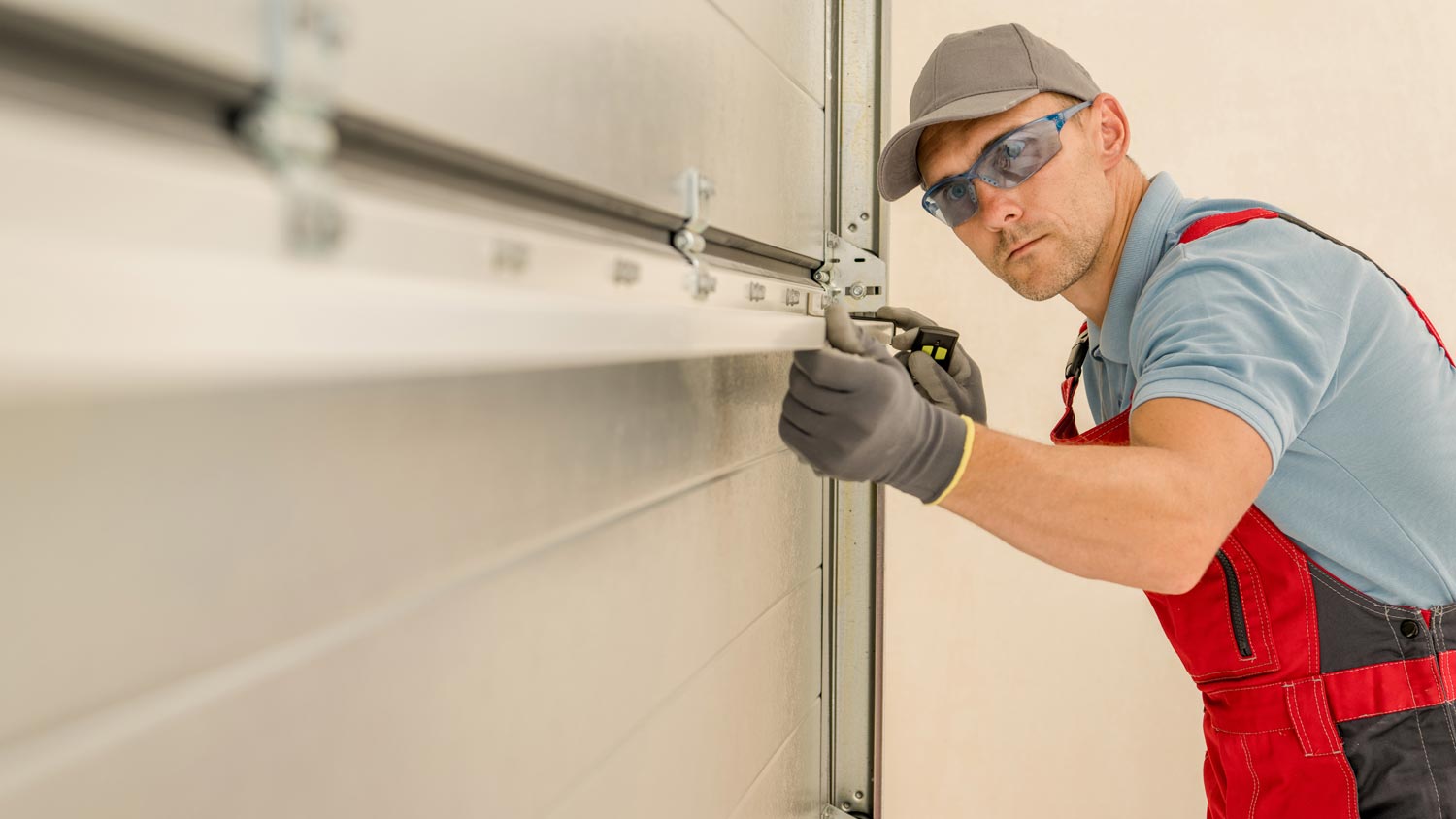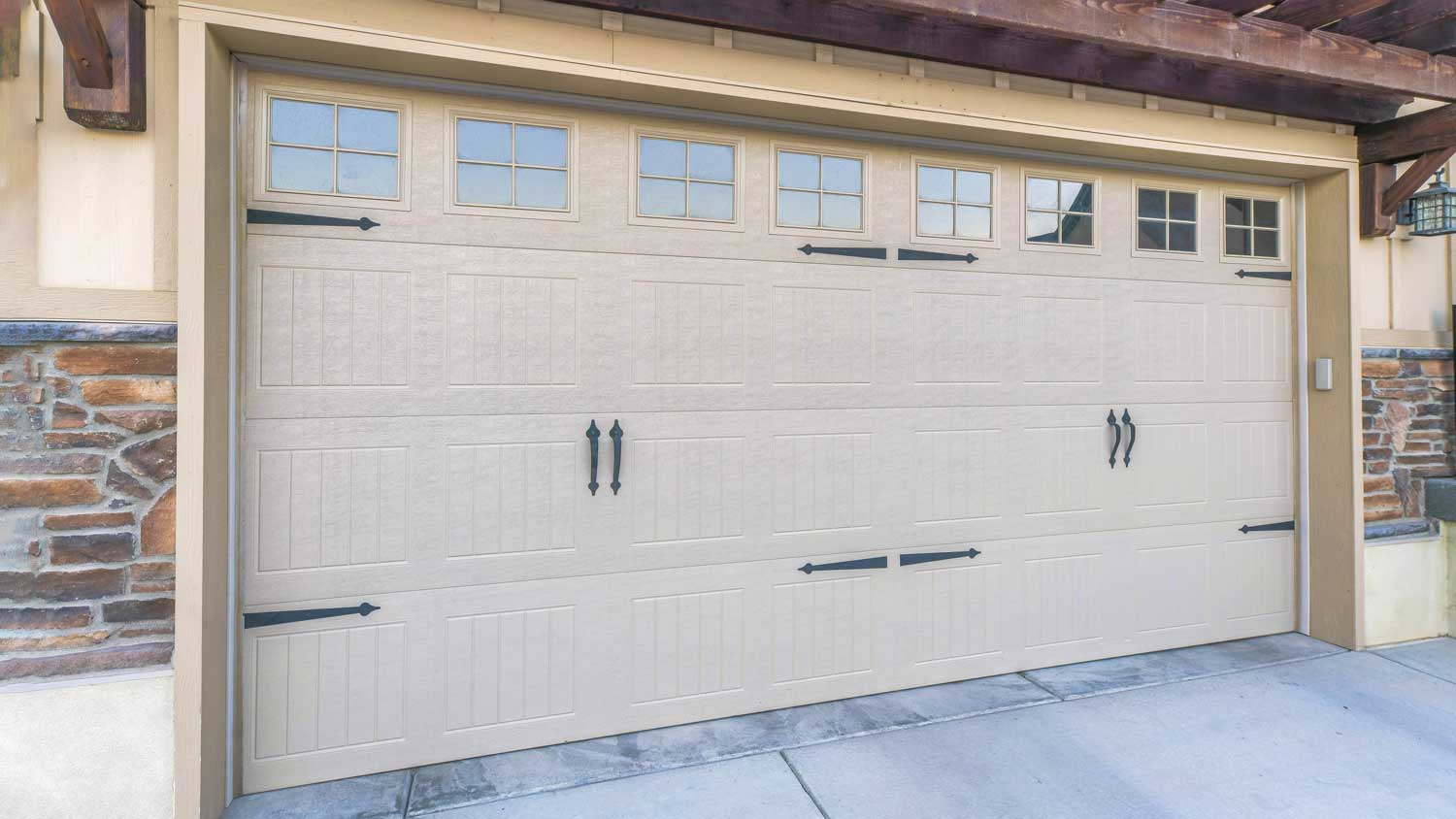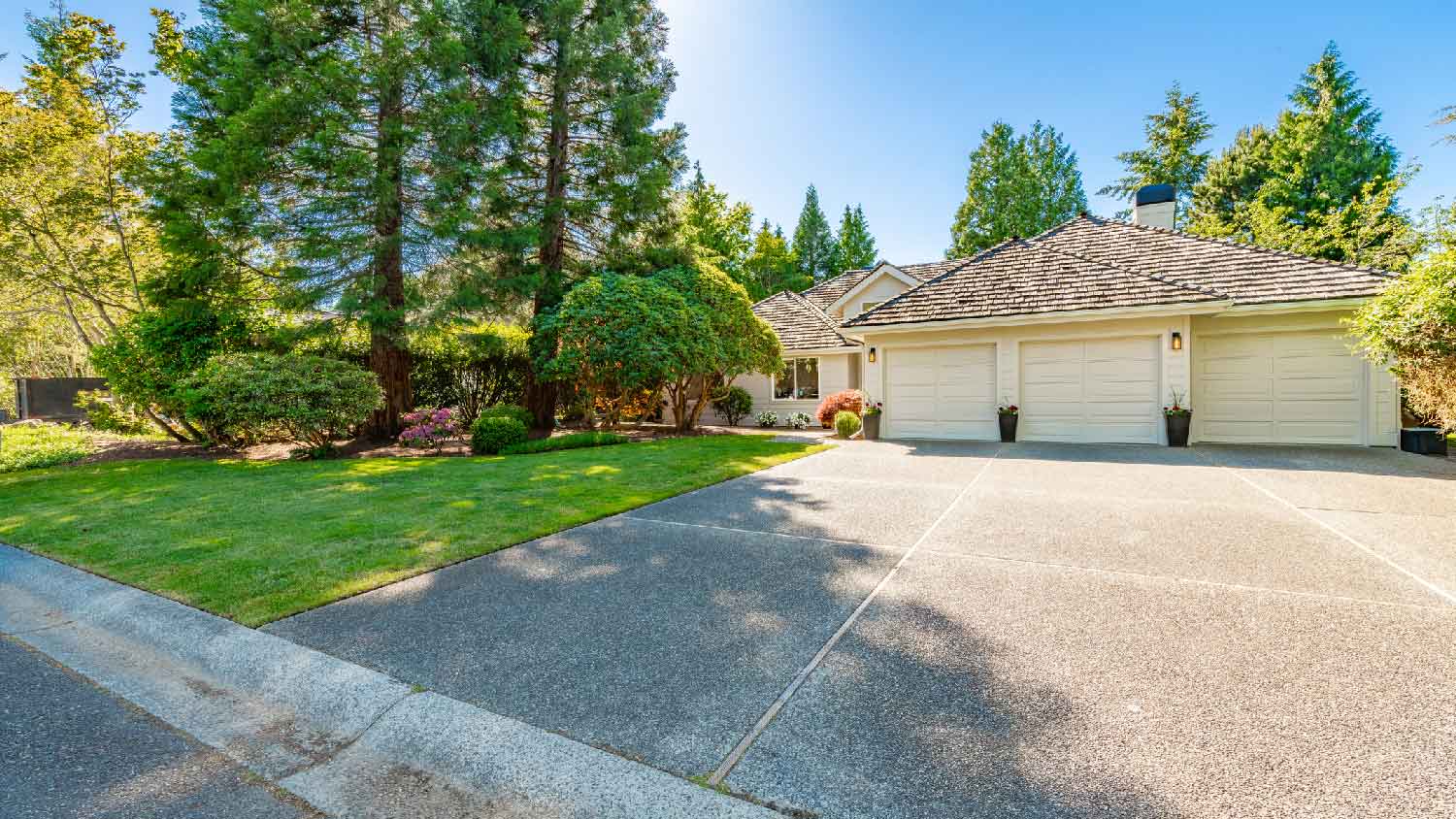How Much Does a Garage Door Replacement Cost? [2025 Data]
Replacing a garage door costs $1,224 on average, but ranges between $754 and $1,696 depending on the type of door used.


Garage door replacement costs about $1,224, but often ranges between $754 and $1,696. You should never underestimate the importance of a reliable garage door for your home. In addition to storing your vehicle, it plays a significant role in your home security. While garage door installation costs are the bulk of the budget for a replacement project, there are other price factors to know.
Garage Door Installation Cost Factors

Don't assume your new garage door will cost as much as your neighbor's. Let's break down all the details that help determine the price of a new garage door.
Door Type
The type of garage door you choose will have an oversized effect on the total project cost. The cost of common door types like tilt-up doors will be much lower than custom projects like French or carriage house doors. Like most projects, the further you move away from common materials and style, the more expensive the project will be—higher-quality materials need high-quality professionals to ensure they are installed correctly and aesthetically.
Garage Door Materials

When considering garage door replacement costs, it's important to consider garage door materials holistically. In addition to the upfront cost of a door, you also need to consider long-term maintenance costs.
Here's a glance at what you may pay for fully installed popular garage door materials:
| Garage Door Material | Cost Range per Door |
|---|---|
| Aluminum | $600–$2,900 |
| Wood | $900–$4,500 |
| Steel | $650–$3,200 |
| False wood or composite | $650–$4,800 |
| Vinyl | $800–$2,500 |
| Fiberglass | $800–$2,700 |
Insulated vs. Uninsulated
If you need to control the temperature inside your garage, consider upgrading to insulated garage doors. These cost more than standard garage doors, but there are reasons why homeowners prefer insulated garage doors over uninsulated ones.
If you spend a significant amount of time working in your garage and live in a cold climate, people who work on cars, bikes, or hobbies in their garages find that paying more for insulated doors is a worthwhile investment.
Garage door manufacturers provide ratings for the insulation capacity of every single garage door. These ratings are known as R-values. A garage door's R-value can range from 0 to 20. While 0 represents a door with no insulation, 20 represents the highest level of insulation possible.
Insulated garage doors cost between $600 and $3,000.
Garage Door Size
The standard single-car garage door in an American house is between 7 to 10 feet wide and 7 to 8 feet tall. Here's a breakdown of what you'll pay based on the size of the garage door you're installing:
| Garage Door size | Cost Range per Door |
|---|---|
| One-car | $500–$3,000 |
| Two-car with one double door | $800–$5,000 |
| Two-car with two single doors | $1,200–$4,900 |
| Three-car with one double and two single doors | $1,400–$7,000 |
| Three-car with three single doors | $1,700–$7,200 |
Garage Door Wiring

If selecting an automatic garage door, expect to add $200 to $1,300 to your budget. The higher end of that price range mainly represents smart garage door openers that allow you to monitor and control your door via app. Most people consider the upgrade to an automatic door more than worth it because this option offers added safety and convenience. It can also be an important detail for your home's resale value.
Labor
While most garage door installers combine labor costs for installation as part of an all-inclusive fee, others will price out labor separately when providing you with an estimate. With most contractors charging between $200 and $500 strictly for installing a new door, the average labor cost for a garage door installation is $350.
Existing Garage Door Removal
First, ask if your garage door installer will haul away your old garage door for free. Many will offer free removal services.
If you need to pay separately to remove your old garage door, you can expect to pay between $50 and $200 for this service. Removal services usually include door removal, hardware, and old garage door tracks.
Repair Work
If you're updating an older garage door, your installation crew may let you know that the structural integrity of the materials surrounding the existing door may not be in the best shape. If you had old or faulty garage doors, water may have seeped into your home's siding or framing to cause rot. This can make installing a new door unwise once all issues are repaired. Repairing a garage door is not simple and, therefore, requires the skills of a professional.
Permits
With a garage door replacement being considered a minor home improvement based on most local codes around the country, you probably don't need to worry about getting a permit to change a garage door. If you'll be altering your home in any way to accommodate a new door, a permit requirement becomes more likely. This can include widening a wall, making a door opening bigger, or removing a pedestrian door to make room for a two-car garage door. Check your local codes before starting your project.
If a permit is needed to install your garage door, expect to pay between $40 and $120. Your garage door installer should obtain the permit on your behalf.
Garage Door Replacement Cost by Type

You can't determine your price range until you've picked your type. Many homeowners don't mind springing for an upscale option when getting a new garage door because they want to boost aesthetic appeal. Additionally, some styles are simply more dynamic than others regarding how the door opens and closes. This quick rundown will help you price out popular garage door types.
| Garage Door Type | Average Cost | Description |
|---|---|---|
| Sectional | $500–$1,800 | Good clearance, easy to install door opener |
| Tilt-up | $400–$1,600 | Used primarily for sheds and barns, must be opened manually |
| Carriage house | $1,200–$8,000 | Country-inspired aesthetic, most feature windows |
| Roll-up | $600–$3,000 | Commonly used for storefronts or storage units, very durable |
| Glass roll-up | $1,000–$7,000 | Used in commercial buildings, offers farmhouse-industrial look |
| French | $2,000–$6,000 | Rarely used, suited for country-inspired architecture |
| Walk-through | $700–$6,000 | Useful for garages without wall space for pedestrian entry |
Installing a Garage Door Yourself vs. Hiring a Pro

If you're thinking of replacing your garage door yourself, saving on labor costs could appeal to you. For many homeowners, a garage door's bulky and unwieldy nature is enough to make them want to hire a pro to do the job. In fact, we strongly recommend that you never install a garage door yourself.
Properly installed garage doors should close quietly and smoothly. Screeches, wobbling, shaking, clunking, and scraping are all signs that a step was done improperly somewhere along the line during installation. While a garage door tune-up may help, it’s something you need to “hire out.”
The most important reason to verify that your garage door is installed properly is that a faulty door can damage people, pets, cars, and your home. Garage door springs can be incredibly difficult to handle. If you lack the tools or expertise to guide these springs correctly, you could have a major accident.
One of the benefits of hiring a pro to install your new garage door is that you'll be using a licensed and insured company. This can protect you in case something goes wrong during installation. Work with a local garage door professional to save time and headaches.
How to Hire a Garage Door Pro
Finding the right garage door replacement company ensures the job is done safely, efficiently, and up to standards. Consider the following key points and questions before hiring:
Verify Licensing and Insurance: Ensure the professional is licensed to confirm their qualifications and insured to protect against potential damages during installation.
Look for Warranties: Choose companies that provide warranties for both the door and installation. This protects your investment and offers peace of mind if issues arise later.
Check Customer Reviews: Read online reviews and ask for referrals to gain insight into the company’s expertise and reliability. Look for consistent positive feedback, particularly for projects similar to yours.
Evaluate Experience: Ask whether they have experience with the specific type of garage door you’ve selected. Proper installation requires familiarity with various door styles and mechanisms.
Ask About Additional Services: Confirm if the company will remove your old door, handle new installations, and offer post-installation support.
How to Save Money on Garage Door Replacement Costs
The best way to save money on a new garage door is to prioritize function over aesthetics. Picking a basic stock model without frills can enable you to get a functional, high-quality door for a low price. Windows, glass panels, wood overlays, high-end metal hardware, raised panels, faux finishes, and other special touches add significant cost.
Steel or aluminum garage doors are the least expensive. While vinyl is considered a mid-priced option, some homeowners are attracted to its low lifetime cost because it requires very little maintenance and doesn’t degrade like wood or steel.
If you're serious about sticking to a budget, don't just walk into a store to pick out a garage door. Instead, ask local garage door installers to review options within your price range. Pros will help you get the specific features important to you by showing you garage doors within your budget.
How Angi Gets Its Cost Data
Home is the most important place on earth, which is why Angi has helped more than 150 million homeowners transform their houses into homes they adore. To help homeowners with their next project, Angi provides readers with the most accurate cost data and upholds strict editorial standards. We’ve surveyed over 10,000 real Angi customers about their project costs to develop the pricing data you see, so you can make the best decisions for you and your home. We pair this data with research from reputable sources, including the U.S. Bureau of Labor Statistics, academic journals, market studies, and interviews with industry experts—all to ensure our prices reflect real-world projects.
Want to help us improve our cost data? Send us a recent project quote to costquotes@angi.com. Quotes and personal information will not be shared publicly.
Frequently Asked Questions
It's not uncommon for a garage door to last 30 years. Of course, you shouldn't rule out replacing a visibly damaged or compromised door just because it's on the newer side. If a garage door was recently damaged by a car, replacement may be the best option for getting ahead of the issue before rot and rust kick in. Other telltale signs that it's time to look into replacing your garage door include visible sagging, cracking, rot, and damaged wood.
Replacing a garage door can take anywhere from three hours to three days. If you can’t repair a broken garage door, you’ll need to remove it entirely before replacing it. The time it takes to replace a garage door depends on the door type and if there was any damage done to the garage that would need to be repaired before installing the new door.
Upgrading a manual garage door to an automatic door can cost up to $2,000. When converting a garage door from manual to automatic, bring in a pro to help you assess the best way to add the required technology to your door. The existing door should first be inspected to confirm its compatibility with the configuration needed to get a door to fold up into tracks on your garage's ceiling.














